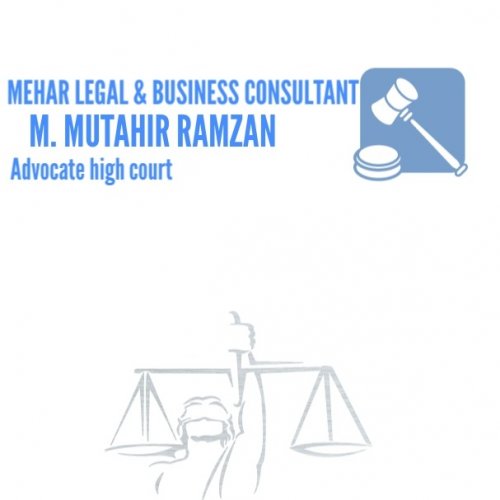Best Bankruptcy & Debt Lawyers in Gujranwala
Share your needs with us, get contacted by law firms.
Free. Takes 2 min.
List of the best lawyers in Gujranwala, Pakistan
About Bankruptcy & Debt Law in Gujranwala, Pakistan
Bankruptcy and Debt law in Gujranwala, Pakistan, as the entirety of the country, is rooted in the Insolvency Ordinance, 2001. The Law pertains to both corporate insolvencies and individual bankruptcies. It primarily involves laws and regulations that are designed to assist individuals and companies who are unable to meet their financial obligations, facilitating orderly debt payment or assets redistribution to creditors.
Why You May Need a Lawyer
You may need a lawyer if you are unable to repay your debts, or someone has declared you bankrupt in court. Bankruptcy and debt laws can be complex and involve filing numerous legal documents. A lawyer can guide you through the bankruptcy process, providing advice on rights, options, and the best course of action. They can also represent you in court and negotiate with creditors on your behalf.
Local Laws Overview
The Insolvency Ordinance, 2001 and The Companies Ordinance, 1984 are the principal legislations dealing with bankruptcy in Pakistan. The laws provide a mechanism for the fair distribution of a debtor's property among creditors and discharge the debtor from further liability. Specialized laws like corporate rehabilitation laws also exist to help financially struggling businesses recover while ensuring fair treatment of creditors.
Frequently Asked Questions
What is the bankruptcy process in Pakistan?
The bankruptcy process starts with the submission of a bankruptcy petition, either by the debtor promulgating the inability to pay off the debts or by the creditors claiming non-payment. The court then adjudges the debtor bankrupt, and an Official Assignee manages the insolvency proceedings, including the debtor's assets distribution among the creditors.
What happens when a company becomes insolvent?
When a company is deemed insolvent, it might undergo liquidation or restructuring, depending on the financial condition and prospects of business revival. A liquidator or an administrator is appointed to oversee the process.
Can a bankrupt person start a new business in Pakistan?
According to Pakistan's insolvency laws, a bankrupt person may not act as a director or manage a company without court permission until the bankruptcy order has been discharged.
What are the consequences of being declared bankrupt?
Once declared bankrupt, you lose control over your assets. Your assets are assigned to the appointed receiver who then distributes it among your creditors. Bankruptcy also affects your credit rating and can have long-term implications.
Can bankruptcy be declared voluntarily?
Yes, if a debtor finds himself unable to repay debts, he may voluntarily petition the court for bankruptcy. However, it's crucial to take legal advice before going down this path due to its ramifications.
Additional Resources
Notable resources for additional support and help include the Securities & Exchange Commission of Pakistan's (SECP) website, which provides information about the Pakistan's insolvency laws and regulations. The Punjab Bar Council's website can provide referrals to lawyers specializing in bankruptcy & debt law.
Next Steps
If you need legal assistance in bankruptcy & debt-related matters, consider consulting a local lawyer who specializes in bankruptcy and insolvencies. Prepare a summary of your financial situation, including a list of debts and assets, before meeting the lawyer. It's also important to gather any legal documents or letters from creditors, as this may assist your lawyer in understanding your case better.
Lawzana helps you find the best lawyers and law firms in Gujranwala through a curated and pre-screened list of qualified legal professionals. Our platform offers rankings and detailed profiles of attorneys and law firms, allowing you to compare based on practice areas, including Bankruptcy & Debt, experience, and client feedback.
Each profile includes a description of the firm's areas of practice, client reviews, team members and partners, year of establishment, spoken languages, office locations, contact information, social media presence, and any published articles or resources. Most firms on our platform speak English and are experienced in both local and international legal matters.
Get a quote from top-rated law firms in Gujranwala, Pakistan — quickly, securely, and without unnecessary hassle.
Disclaimer:
The information provided on this page is for general informational purposes only and does not constitute legal advice. While we strive to ensure the accuracy and relevance of the content, legal information may change over time, and interpretations of the law can vary. You should always consult with a qualified legal professional for advice specific to your situation.
We disclaim all liability for actions taken or not taken based on the content of this page. If you believe any information is incorrect or outdated, please contact us, and we will review and update it where appropriate.
Browse bankruptcy & debt law firms by service in Gujranwala, Pakistan
Gujranwala, Pakistan Attorneys in related practice areas.









